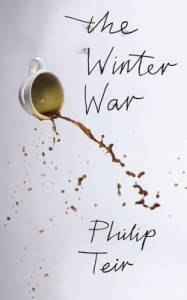
Almost sixty, Max is a professor of sociology at the University of Helsinki, struggling with all that his approaching milestone means and with his book on nineteenth century sociologist Edvard Westermarck. He’s been busy living off one piece of research, which earned him the soubriquet ‘young intellectual of the decade’, for quite some time. Katriina – who views marriage as ‘a form of reciprocal tyranny’ – works in the health service, recruiting staff to deal with Helsinki’s ageing population, travelling to the Philippines and grappling with her liberal conscience while doing so. They have two daughters. Helen, who married young, teaches high school and is the mother of two young children. Eva, twenty-nine and studying fine art in London after dropping out of her Helsinki course, is embroiled in an affair with her tutor. A fairly standard issue white middle-class family, then, with all its niggling disquiets and discontents.
The Winter War is a very satisfying novel. It draws you in with its strong but sympathetic characterisation and its knowing humour, poking gentle fun at Max and his late midlife crisis shenanigans. Teir shifts his narrative smoothly from character to character, unfolding their various struggles, unhappinesses and crises. Things are brought neatly to a head when Max’s ageing mother suffers a stroke, focusing the minds of all of them with surprising results for some. It’s a novel with much to say about marriage, at least unhappy ones but as Max says quoting Westermarck ‘people seldom talk about happy marriages…“Those are not the ones on which theatres, biographies and novelists build their dramas.”’ It’s a fine winter read, the kind of novel you can tuck yourself up and settle into. As for those comparisons, none of the aforementioned sprung to mind for me: if I was reminded of anyone it was Richard Russo who has a fine line in humour and a deft hand with characterisation.


Haha!! Comparisons are no good !! The only book of Russo’s I have read is That Old Cape Magic ….which I read when I was in Cape cod and thought was a load of old rubbish !!!
I have read several reviews of the book and it definitely sounds like my sort of thing . I noticed last weekend that it is also out in France and getting a lot of publicity.
Well, if you can find it in your heart to try another Russo, Helen, I’d heartily recommend The Straight Man – very funny. Already hoping for another from Mr Teir soon!
Fab review, Susan. I also enjoyed this novel, especially the wry humour which is one of the things I asked the author about in the Q&A here:
http://annegoodwin.weebly.com/philip-teir.html
I have heard of Richard Russo but don’t think I’ve read anything by him – what would you recommend?
Thanks for the link, Anne. I’ll drop in and take a look. As for Russo, I’d recommend The Straight Man. Very funny, and spot on about academic politics according to my partner.
I liked this too and found the Franzen comparison worked. But I haven’t reac Russo so I wouldn’t know. In any case, you’re right, he’s a good writer in his own right.
Ah, I’m not a Franzen fan so that would have put me off had the synopsis not been so appealing. I’m hoping (greedily) for a second novel from Teir soon
I’m not a Franzen fan either but there’s something in the choice of topics that reminded me of him. Overall I liked Teir much better as well.
This sounds really interesting, lovely review!
Thank you! Very enjoyable novel, one that you can get your teeth into.
I very much enjoyed this too. I’ll be reviewing it for SNB at the end of the month. Funnily enough the person who dropped into my mind was Alison Lurie – if she had a more bleak, Nordic outlook! Richard Russo is a good call, though.
It’s a very long time since I read Alison Lurie! I think Max’s job helped prompt the Richard Russo comparison. I’ll look forward to your review, Victoria.
Pingback: Paperbacks to Look Out For in September 2015 | A life in books